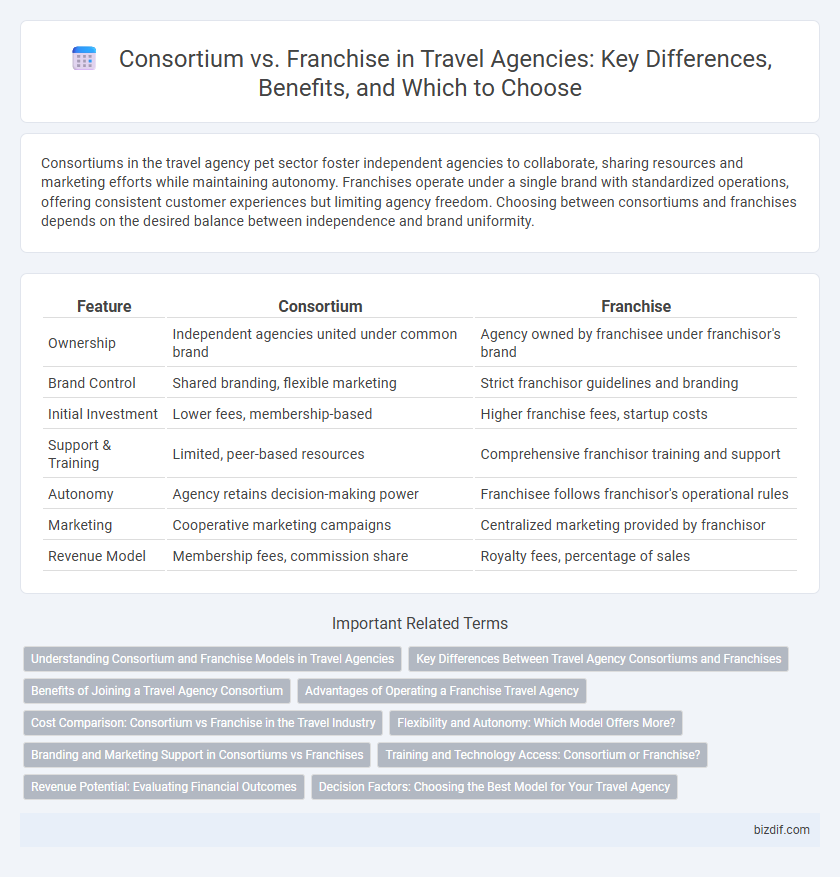Consortiums in the travel agency pet sector foster independent agencies to collaborate, sharing resources and marketing efforts while maintaining autonomy. Franchises operate under a single brand with standardized operations, offering consistent customer experiences but limiting agency freedom. Choosing between consortiums and franchises depends on the desired balance between independence and brand uniformity.
Table of Comparison
| Feature | Consortium | Franchise |
|---|---|---|
| Ownership | Independent agencies united under common brand | Agency owned by franchisee under franchisor's brand |
| Brand Control | Shared branding, flexible marketing | Strict franchisor guidelines and branding |
| Initial Investment | Lower fees, membership-based | Higher franchise fees, startup costs |
| Support & Training | Limited, peer-based resources | Comprehensive franchisor training and support |
| Autonomy | Agency retains decision-making power | Franchisee follows franchisor's operational rules |
| Marketing | Cooperative marketing campaigns | Centralized marketing provided by franchisor |
| Revenue Model | Membership fees, commission share | Royalty fees, percentage of sales |
Understanding Consortium and Franchise Models in Travel Agencies
Consortium models in travel agencies involve independent agencies collaborating under a shared brand to leverage collective buying power and marketing resources, enhancing competitiveness without sacrificing autonomy. Franchise models require travel agencies to operate under a franchise brand, adhering to standardized procedures and benefiting from established brand recognition, marketing support, and operational systems. Both models provide strategic advantages: consortiums foster flexibility and collaboration, while franchises offer consistency and brand strength.
Key Differences Between Travel Agency Consortiums and Franchises
Travel agency consortiums involve independent agencies collaborating to leverage collective purchasing power and shared marketing resources while maintaining operational autonomy. Franchises require agencies to operate under a unified brand with standardized procedures, paying franchise fees and adhering to strict corporate guidelines. The key differences lie in ownership control, brand identity, financial commitments, and the level of centralized support provided.
Benefits of Joining a Travel Agency Consortium
Joining a travel agency consortium provides access to exclusive supplier discounts and enhanced booking tools, which significantly increase profitability for independent agents. Members benefit from shared marketing resources and collective buying power, enabling competitive pricing and improved customer offerings. This collaboration fosters industry networking and continuous education, empowering agencies to stay ahead in a rapidly evolving travel market.
Advantages of Operating a Franchise Travel Agency
Operating a franchise travel agency offers access to established brand recognition, comprehensive training programs, and ongoing marketing support, which significantly reduces startup risk and accelerates business growth. Franchisees benefit from centralized booking systems and negotiated supplier contracts, enabling competitive pricing and enhanced customer service. Strong network support and standardized operational procedures streamline management, allowing franchise owners to focus on client relationships and sales.
Cost Comparison: Consortium vs Franchise in the Travel Industry
Consortiums in the travel industry typically demand lower upfront fees and offer shared marketing resources, reducing operational costs for member agencies. Franchise models often involve higher initial franchise fees and ongoing royalties, creating a more substantial financial commitment but providing established brand recognition and centralized support. Cost efficiency in consortia arises from collective bargaining power and resource sharing, whereas franchises balance higher costs with structured business models and brand equity.
Flexibility and Autonomy: Which Model Offers More?
Consortiums often provide greater flexibility and autonomy for travel agencies by allowing independent operators to collaborate while retaining control over their business decisions and branding. Franchises typically require adherence to strict operational guidelines and standardized processes, limiting individual agency customization but offering consistent brand recognition and support. For agencies prioritizing personalized service and decision-making freedom, consortiums present a more adaptable model, whereas franchises suit those seeking structure and uniformity.
Branding and Marketing Support in Consortiums vs Franchises
Consortiums provide travel agencies with collective branding and pooled marketing resources, enabling cost-effective campaigns that leverage the network's reputation while maintaining individual business identities. Franchises offer standardized branding and comprehensive marketing support, ensuring consistent brand recognition and national advertising campaigns driven by the franchisor. Travel agencies in franchises benefit from established brand equity and centralized marketing strategies, whereas consortium members gain flexibility and shared promotional efforts without full brand uniformity.
Training and Technology Access: Consortium or Franchise?
Franchise models typically provide comprehensive training programs and exclusive access to proprietary technology platforms, ensuring standardized service quality and operational efficiency across all locations. Consortia offer training resources and technology access shared among member agencies, promoting collaboration but often with less uniformity and proprietary control. Travel agents prioritizing consistent brand support and advanced tech tools usually benefit more from franchise arrangements.
Revenue Potential: Evaluating Financial Outcomes
Consortium memberships often enable travel agencies to leverage collective purchasing power and shared marketing resources, resulting in potentially higher revenue through reduced operational costs and increased client reach. Franchise models provide established brand recognition and proven business systems, which can lead to predictable income streams but may involve significant royalty fees that impact net revenue. Evaluating revenue potential requires balancing the cost efficiencies and collaborative benefits of a consortium against the brand strength and structured support of a franchise.
Decision Factors: Choosing the Best Model for Your Travel Agency
Choosing between a consortium and a franchise for your travel agency hinges on decision factors such as control, brand identity, and financial investment. Consortia offer greater operational freedom and access to shared marketing resources without stringent brand guidelines, while franchises provide established branding and proven business models at the cost of higher fees and limited autonomy. Evaluating elements like startup costs, ongoing support, and desired independence helps determine the optimal model aligning with business goals and market strategy.
Consortium vs Franchise Infographic

 bizdif.com
bizdif.com